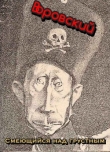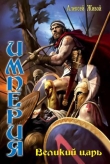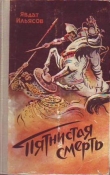
Текст книги "И ЕГО ИСТОРИЧЕСКИЙ ТРУД"
Автор книги: Джуаншер Джуаншериани
Жанр:
Альтернативная история
сообщить о нарушении
Текущая страница: 9 (всего у книги 9 страниц)
Вслед за этим пришел Арчил в Кахети и всем придворным43 своим даровал он Кахети, сделал их азнаурами, воздвиг церковь в Садзмори. Женился на дочери Гуарама куропалата, что был потомком одного из детей царя Вахтанга, рожденный женой-гречанкой. И осел в Цукети, построил замок44, а в ущелье Лакуасти воздвиг крепость. И застал в Цукети правителей45, которым Цукети был дарован царем Вахтангом, а тушами, хунзами и всеми язычниками тех мест правил эристав Абухосро, и не изъявил (Арчил) желания изъять у него Цукети46. // И построил (Арчил) в междуречье город-крепость Нухпати. Нухпатийцы же были язычниками и природы хищной, но Глухой посек их множество. И силой крестил их Арчил.
Усилились сарацины на земле Рана. Завоевали Газир47 и Армению. А Маслама воевал с греками. Племянники же Адарнасе Слепого, трое братьев, что выжгли глаза брату отца своего, прибыли из Тарона в Шаких и обосновались там по велению Арчила, ибо все пределы Кавказа до Рана были обезлюдены. hЕрети же и Кахети спаслись из-за обилия лесов. И утвердились трое братьев там до самой Гулгулы.
В ту же пору некоторых питиахшей не впустили в Кларджети, (тогда) половина их ушла и они завладели скальной местностью в Тао, которая называлась Калмахи, и построили там крепость.
(Другая же) половина явилась в Кахети к Арчилу. За одного выдал замуж (женщину) из рода Абухосро, потому как была та вдовой и не имела мужа, и даровал им Цукети заодно с крепостью и замком. В ту пору, на пятидесятом году после ухода Глухого, пытались сарацины вторгнуться в Картли. До сей поры они не вторгались, но получали дань от эриставов.
И было у Арчила двое сыновей: Джуаншер и Иован, да четверо дочерей: Гурандухт, Мария, Мирандухт и Шушан48.
* Дословно: «сын брата».
** В скобках указаны страницы в соответствии с пагинацией текста свода КЦ (от ред. Отдела электронных текстов Национальной парламентской библиотеки Грузии).
* В оригинале – мианича – досл.: «одарил».
* Дословно: «сын брата».
* Дословно: «брат матери».
* Дословно: «сын сестры».
* В оригинале: эджиб.
* Дословно: «сын сестры».
* Дословно: «сын его брата».
* Дословно: «детям детей».
* Дословно: «сына сестры».
* Дословно: «детей брата своего».
JUANSHER JUANSHERIANI
THE LIFE OF VAKHTANG GORGASAL
Summary
The origins of this monument of ancient Georgian literature dates back to the 11th century. The central figure of the story is Vakhtang Gorgasal – one of the prominent figures of ancient Georgia – who lived in the second half of the 5th century A. D. The fact that the author wrote about events which had happened six centuries earlier, has naturally influenced the contents of his work. It abounds in anachronisms, and various mistakes, and historical facts are sometimes confused. More than this, the author sometimes gives free rein to his imagination. Therefore it is no wonder that "The Life of Vakhtang Gorgasal" was not considered by many critical historians as a reliable source of information. However, recent studies in interpretation of historical sources have achieved a significant success and thus it has become possible to find a kernel of truth even in the most "fantastic" ideas about the remote past. During recent decades many scholars (both in Georgia and outside its boundaries) came to the conclusion that his monument of ancient Georgian literature must be investigated more seriously and in more details. As a result of such investigations it was discovered that considerable amount of information contained in this monument stands the test of control sources of both Georgian and non-Georgian origin. Such a result is very important, the more so that the period to which this work is devoted as well as the time when it was written are rather poor in written sources reflecting the history of the peoples of USSR as a whole and the Caucasus in particular.
This is the first time that this work of Juansher has been translated into Russian. The translation is supplemented by a preface – "Juansher Juansheriani and his historical work"-and by detailed comments. It is also the first time that the so called "historical chronicle" of pseudo-Juansher is published separately in appendix. This piece of ancient Georgian literature has been detached from the traditionally established text of Juansher's work. The appendix is also supplied by the comments.
The translation is done from the critically verified text (textus receptus) of "Kartlis Tskhovreba" (The History of Georgia), vol. I. Prepared for edition by S. G. Kaukhchishvili. Tbilisi, 1955, in the ancient Georgian language, pp. 139-244.








